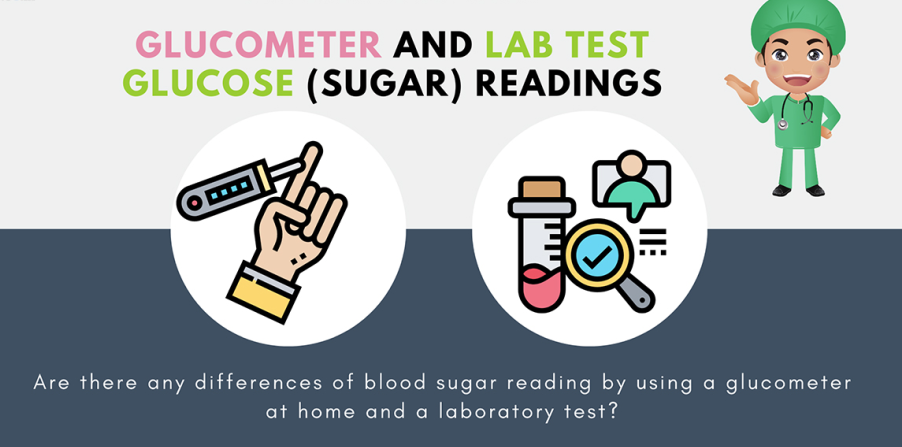Diabetes is a chronic disease that affects millions of people worldwide. Those who suffer from diabetes need to monitor their blood sugar levels regularly. This monitoring can be done in two ways: through a glucometer or a lab test. However, the question arises, how much difference is there between these two methods?
While a glucometer is a portable device that can be used at home to monitor blood sugar levels, a lab test is performed in a clinical setting. Both methods have their advantages and limitations, and it is essential to understand these differences. In this article, we will explore the similarities, differences, and accuracy of these methods to help you make an informed decision on which method is suitable for you.
Glucometers are reliable instruments for measuring blood glucose levels. However, their accuracy may not be as precise as lab tests. This is because glucometers measure glucose in the interstitial fluid, whereas lab tests measure glucose in the blood. The difference between the two methods may vary depending on the individual’s health condition. It is always best to consult a healthcare professional for accurate readings.

Understanding the difference between glucometer and lab test
If you are living with diabetes, you know that monitoring your blood glucose levels is an important part of managing your condition. Glucometers are a popular tool used by many people to check their blood glucose levels at home. But how accurate are these devices compared to lab tests? In this article, we will explore the difference between glucometer and lab test.
Glucometer
Glucometers are portable, handheld devices that measure blood glucose levels from a small sample of blood. They are widely used by people with diabetes to monitor their blood glucose levels on a daily basis. Glucometers use test strips that contain chemicals that react with glucose in the blood to produce a reading. The reading is displayed on a small screen on the glucometer.
One of the benefits of using a glucometer is that it provides a quick and convenient way to check your blood glucose levels. You can use it anywhere, anytime, without the need for a lab test. Glucometers are also relatively inexpensive, and many insurance plans cover the cost of the device and test strips.
Pros of using a glucometer:
- Quick and convenient
- Can be used anywhere, anytime
- Relatively inexpensive
However, there are some limitations to using a glucometer. The accuracy of the device can be affected by several factors, including user error, environmental conditions, and the quality of the test strips. Glucometers may also provide different readings from lab tests, which can make it difficult to determine the true blood glucose level.
Cons of using a glucometer:
- Accuracy can be affected by user error, environmental conditions, and quality of test strips
- May provide different readings from lab tests
Lab Test
A lab test, also known as a blood glucose test, is a more accurate way to measure blood glucose levels than a glucometer. Lab tests are performed in a medical laboratory using sophisticated equipment and techniques. A lab test requires a larger sample of blood than a glucometer, and the results may take several hours or days to be processed.
One of the benefits of a lab test is that it provides a more accurate measurement of blood glucose levels. Lab tests are less likely to be affected by user error, environmental conditions, and the quality of the test strips. Lab tests can also provide more detailed information about blood glucose levels, including trends over time.
Pros of a lab test:
- More accurate measurement of blood glucose levels
- Less likely to be affected by user error, environmental conditions, and quality of test strips
- Can provide more detailed information about blood glucose levels
However, there are also some limitations to using a lab test. Lab tests are more expensive than glucometers, and they may not be covered by insurance. Lab tests also require a trip to a medical facility and may be inconvenient for some people.
Cons of a lab test:
- More expensive than glucometers
- May not be covered by insurance
- Requires a trip to a medical facility
Glucometer vs. Lab Test
So, which is better: a glucometer or a lab test? The answer depends on your individual needs and circumstances. If you need to monitor your blood glucose levels frequently and quickly, a glucometer may be the best option for you. If you need a more accurate measurement of your blood glucose levels or want more detailed information about your levels, a lab test may be a better choice.
It’s important to note that a glucometer can be a useful tool for monitoring your blood glucose levels, but it should not replace regular visits to your healthcare provider or lab tests. Your healthcare provider can help you determine the best way to monitor your blood glucose levels and adjust your treatment plan as needed.
Frequently Asked Questions
In this section, we will answer some of the frequently asked questions about the difference between glucometer and lab test.
What is a glucometer?
A glucometer is a medical device that is used to measure the glucose level in the blood. It is a portable and easy-to-use device that provides quick and accurate results. The glucometer works by pricking the skin with a small needle and drawing a drop of blood, which is then placed on a test strip that is inserted into the device. The device then measures the glucose level in the blood and displays the result on a screen.
Although a glucometer is a useful device for monitoring blood glucose levels at home, it is not as accurate as a lab test. The accuracy of a glucometer can vary depending on factors such as the quality of the device, the technique used to obtain the blood sample, and the environment in which the test is performed.
What is a lab test?
A lab test, also known as a laboratory test, is a medical test that is performed in a laboratory. It involves analyzing a blood sample that is taken from a vein in the arm using a needle. The blood sample is then analyzed using sophisticated equipment to measure the glucose level in the blood. Lab tests are performed by trained professionals and are considered to be more accurate than glucometer tests.
Lab tests are usually performed in a hospital or clinic, and the results are typically available within a few days. These tests are used to diagnose and monitor a variety of medical conditions, including diabetes.
What is the difference between a glucometer and a lab test?
The main difference between a glucometer and a lab test is the accuracy of the results. Glucometers are less accurate than lab tests, and the results can vary depending on the quality of the device, the technique used to obtain the blood sample, and the environment in which the test is performed. Lab tests, on the other hand, are performed in a controlled environment by trained professionals and are considered to be more accurate.
Glucometers are also easier to use and can be used at home to monitor blood glucose levels. Lab tests, on the other hand, require a blood sample to be taken from a vein in the arm and are usually performed in a hospital or clinic.
When should I use a glucometer?
A glucometer is a useful device for monitoring blood glucose levels at home. It can be used by people with diabetes to check their blood glucose levels throughout the day and to adjust their medication or diet as needed. Glucometers are also useful for people who are at risk of developing diabetes or who have a family history of diabetes.
If you are experiencing symptoms of diabetes, such as frequent urination, excessive thirst, or blurred vision, you should see a healthcare professional for a lab test to diagnose the condition.
When should I get a lab test?
A lab test is recommended if you are experiencing symptoms of diabetes, such as frequent urination, excessive thirst, or blurred vision. It is also recommended if you are at risk of developing diabetes or if you have a family history of diabetes. A lab test can diagnose the condition and provide accurate information about your blood glucose levels.
If you are using a glucometer at home and the results are consistently high or low, you should see a healthcare professional for a lab test to confirm the results and to adjust your medication or diet as needed.
Conclusion
In summary, both glucometers and lab tests have their advantages and disadvantages. Glucometers are quick, convenient, and relatively inexpensive, but they may not provide the most accurate measurement of blood glucose levels. Lab tests are more accurate and provide more detailed information, but they are more expensive and require a trip to a medical facility. Ultimately, the choice between a glucometer and a lab test depends on your individual needs and circumstances.

